Keyword research tools are essential for companies, marketers, bloggers, and SEO professionals who wish to improve their online presence. Keyword research tools help identify high-volume keywords, establish search intent, and keep up with competitor strategy to make content better optimized and perform higher on search engine results. If you’re running an e-commerce website, blogging, or optimizing PPC campaigns, keyword research tools provide valuable insights into consumer behavior and market trends.
The following tools are selected on the grounds of accuracy, volume of databases, intent analysis for searches, competitor data, usability, integrations, and cost. They are ideal for different types of consumers including digital marketers, content creators, and business owners who need to optimize SEO and ad campaigns. Choosing the right tool for keyword research can greatly affect the performance of content and digital marketing campaigns.
Criteria for Selecting the Best Keyword Research Tools
When choosing the top keyword research tools, there are a few important factors to consider to guarantee they deliver your SEO and content strategy goals.
- Keyword Accuracy & Database Size: The tool should provide precise keyword information with a large and always updated database to uncover new possibilities.
- Search Volume & Competition Analysis: Accurate search volume, keyword difficulty, and competition-level data help choose the right keywords.
- Search Intent Analysis: Understanding whether a keyword is informational, navigational, or transactional is highly important for relevance in content.
- Keyword Suggestions & Clustering: Those tools that have similar keyword suggestions and AI clustering help plan the content more effectively.
- Comparison to Competitors: Competitor rank and keyword analysis are extremely strategic.
- Integration with Search Engine Optimization & Pay Per Click: Effortless integration saves time using Google Ads, Google Analytics, and SEO.
- Ease of Use and User Interface: Easy-to-use dashboard and clear layout boost productivity, especially among beginners.
- Value for Money & Pricing: Free or paid, the tool should provide an equilibrium of capability and price for your needs.
- Added SEO Features: Tools can contain extra features like backlink check, rank, and content optimization.
- Platform Compatibility: Browser extensions, mobile support, and API provision can add capabilities for different workflows.
List of 16 Keyword Research Tools
1. Google Keyword Planner
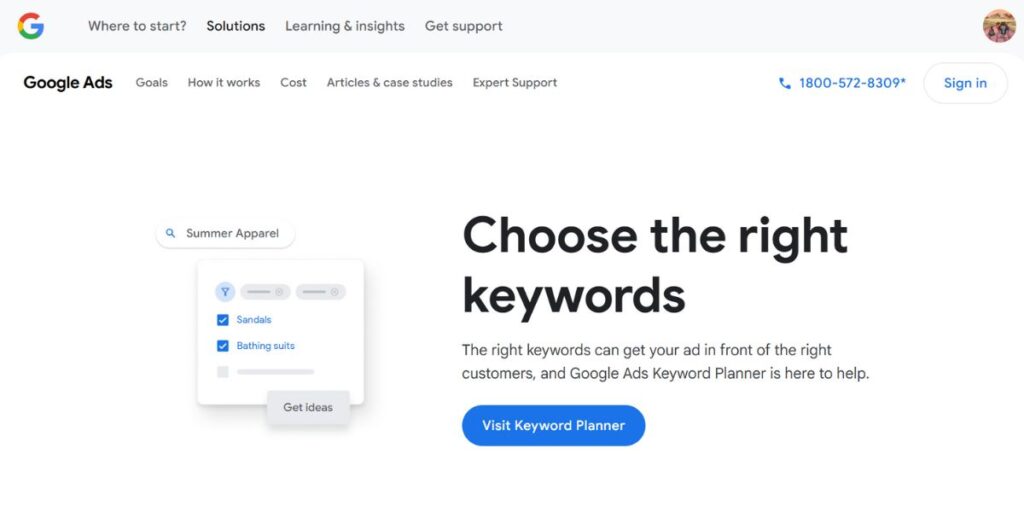
The keyword research tool Google Keyword Planner exists as a cost-free platform built for advertisers who serve as wide-reaching assets for SEO professionals. Users can locate fresh keywords through Google Keyword Planner either by entering seeds or examining website pages. Users obtain important keyword metrics through this tool but precise search volume numbers remain imprecise because its data primarily serves the Google Ads platform. The tool suits advertisers and SEO professionals together with marketers who require standard keyword data for their work.
Key Features:
- Keyword search volume and trends
- CPC (cost per click) data for PPC campaigns
- Competitive analysis for keywords
- Location-based keyword insights
Pros:
- Free and reliable with real Google data
- Integrates with Google Ads for PPC insights
Cons:
- Limited data for organic SEO
- Requires a Google Ads account to access full data
Pricing: Free
Who Should Use It?
SEO professionals, PPC advertisers, and content marketers looking for Google-based keyword insights.
Also Read: Article submission
2. SEMrush
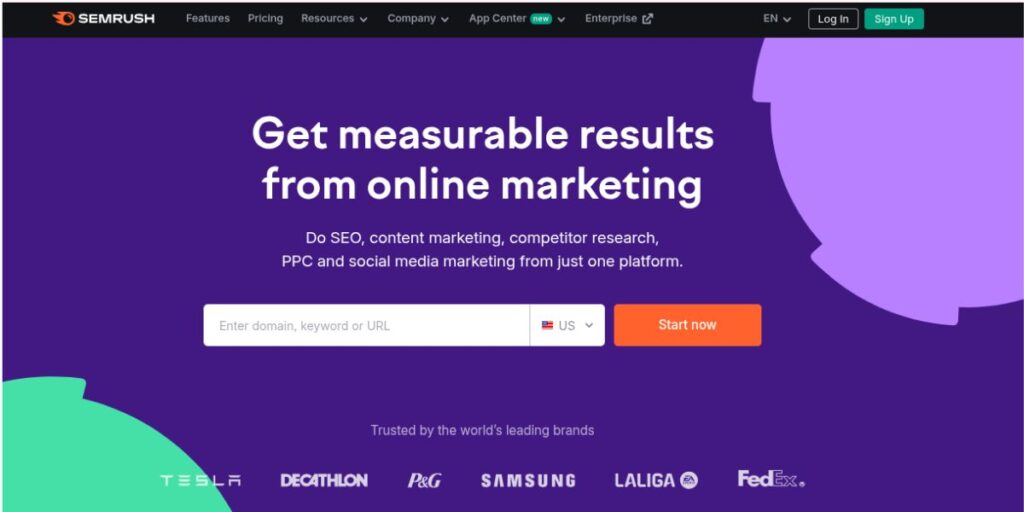
SEMrush provides its users with keyword difficulty scores and generates traffic estimation data as well as suggests related keywords. The tool orientates users with SERP rankings as well as examines competitive keyword collections which makes it preferred by digital marketers. SEMrush retains millions of keywords in its database for complete keyword coverage. This product contains many features yet demands an expensive cost. The platform best serves SEO professionals, content marketers, and companies that depend on detailed keywords together with competitor analytics.
Key Features:
- Keyword difficulty analysis
- Competitor keyword tracking
- PPC and organic keyword insights
- Keyword gap analysis
Pros:
- Comprehensive SEO and PPC research
- Excellent competitor analysis tools
Cons:
- Expensive for beginners
- Can be overwhelming for new users
Pricing: Starts at $139.95/month
Who Should Use It?
SEO agencies, marketers, and businesses need deep keyword and competitor insights.
3. Ahrefs Keywords Explorer
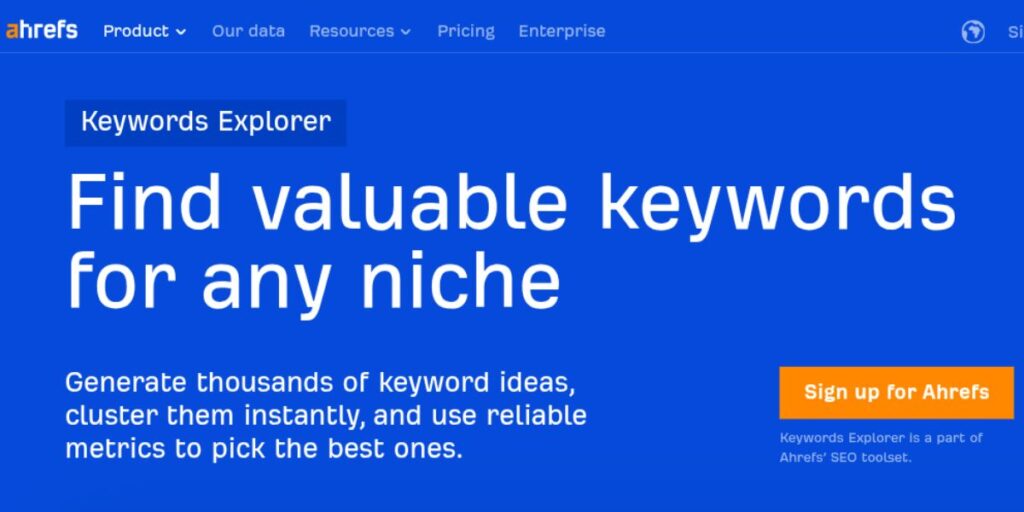
Ahrefs Keywords Explorer enables searches through several search platforms which include Google and both Google YouTube and Amazon. Operating through its competitor keyword analysis function enables users to find keywords with strong performance. Ahrefs holds a position as one of the top trusted SEO tools because it maintains a massive database of keywords. At the beginning stage, this platform costs an expensive amount of money to use. SEO professionals along with content marketers benefit from this tool with businesses that require advanced keyword analytics and ranking possibilities.
Key Features:
- Keyword difficulty and search volume analysis
- Click-through rate (CTR) metrics
- SERP analysis for keyword ranking insights
- Global keyword data across multiple search engines
Pros:
- Extensive backlink and competitor analysis
- Accurate keyword difficulty scores
Cons:
- Expensive compared to other tools
- Limited free features
Pricing: Starts at €119 /month
Who Should Use It?
SEO professionals, content strategists, and digital marketers focusing on organic search growth.
4. Ubersuggest
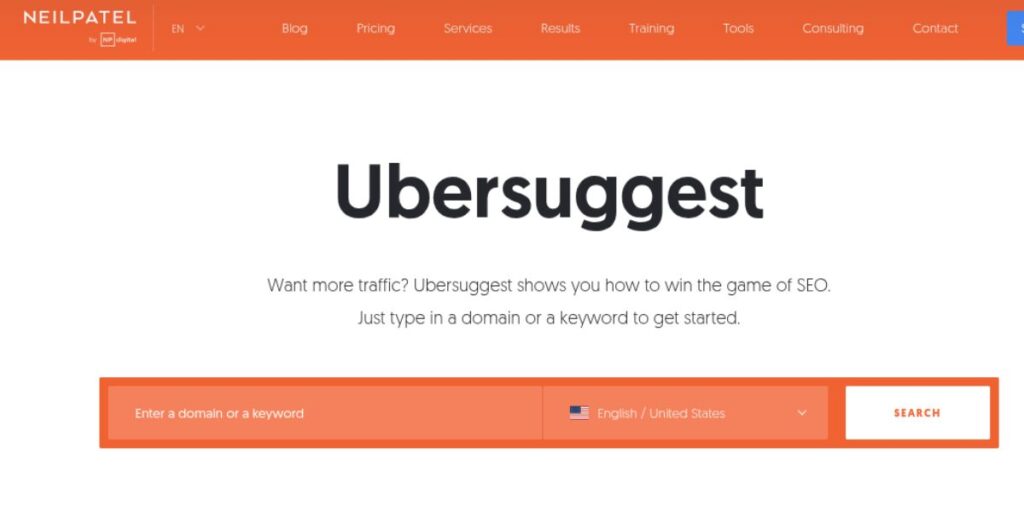
The search engine tool Ubersuggest delivers a simple interface and provides users with results for search volume and keyword difficulty as well as competitor examination capabilities. Users receive recommended keywords through this tool and it monitors site rankings. Ubersuggest features a complete package that includes SEO audit tools as well as backlink information which provides users with broad functionality. Although it provides a strong value proposition, the smaller keyword database of Ubersuggest is weaker than the premium tools Ahrefs or SEMrush. Small business owners and bloggers along with freelance marketers represent the best users of this platform.
Key Features:
- Keyword ideas with search volume and competition level
- Domain analysis for competitor insights
- Content ideas and backlink data
- SEO audit tool
Pros:
- Affordable and beginner-friendly
- Offers a free version with limited features
Cons:
- Data may not be as comprehensive as SEMrush or Ahrefs
- Limited competitor analysis capabilities
Pricing: Free with limited searches, paid plans start at $12/month
Who Should Use It?
Freelancers, bloggers, and small businesses looking for an affordable SEO tool.
5. smartminded
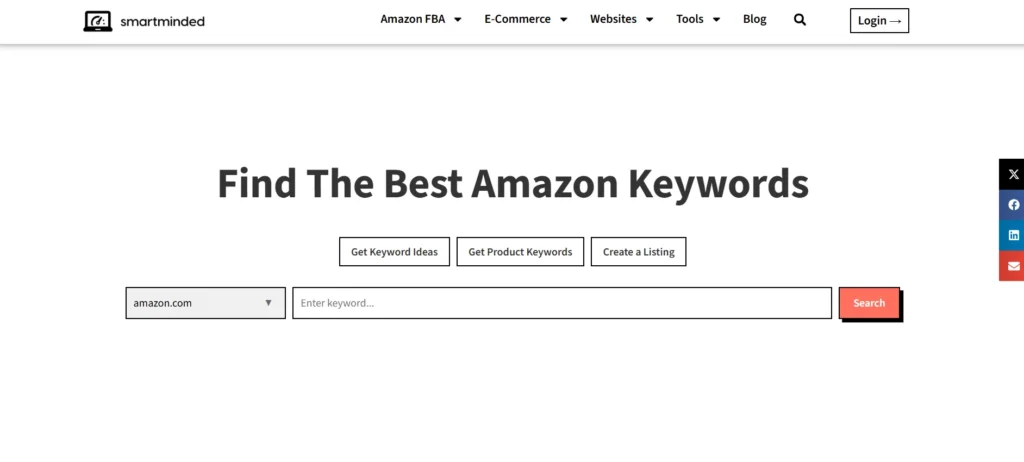
smartminded’s tool is built specifically for Amazon. Not Google, not Bing. So when you punch in a seed keyword into , you get suggestions that actual Amazon shoppers type into the search bar. The competitor analysis feature? That’s where things get interesting.
You can literally see what keywords your competitors rank for (pretty handy when you’re trying to figure out why their similar product outsells yours) – and this is all for free! They also have a free AI Listing Generator. Need bullet points? Product titles? It writes them for you.
What you get:
- Keyword recommendations based on one seed keyword
- Inisghts into your competitor’s keywords
- AI that writes listing components
- Zero cost for everything – all for free
Pros:
- Actually free (no “free trial” BS)
- Built for Amazon sellers, not general SEO
- AI writing tools included
Cons:
- No comprehensive features
- Listing Builer has a weak performance
Cost: $0.
Who should use this?
New sellers who aren’t ready to drop serious cash on tools yet. Small businesses testing Amazon. Anyone who wants to see if keyword research actually moves the needle before committing to expensive subscriptions.
6. Moz Keyword Explorer

Moz Keyword Explorer serves as a search engine optimization tool for keyword discovery which assists users through the analysis of keywords by their search volume and difficulty levels and organic click-through rates. Users can access related keyword options and search intent prioritization from this tool. Users gain an understanding of ranking opportunities through SERP analysis provided by the tool. Users admire Moz for its precise results but notice it provides lower PPC features compared to premium competitor tools. This tool suits both SEO experts content developers and firms engaged in natural search engine optimization.
Key Features:
- Keyword difficulty and priority scores
- SERP analysis and competitor research
- Organic CTR insights
- Keyword list management
Pros:
- High-quality keyword difficulty analysis
- User-friendly interface
Cons:
- Limited free searches per month
- Less extensive database compared to Ahrefs and SEMrush
Pricing: Starts at $99/month
Who Should Use It?
SEO specialists and marketers who need an intuitive keyword research tool with accurate difficulty metrics.
7. KWFinder
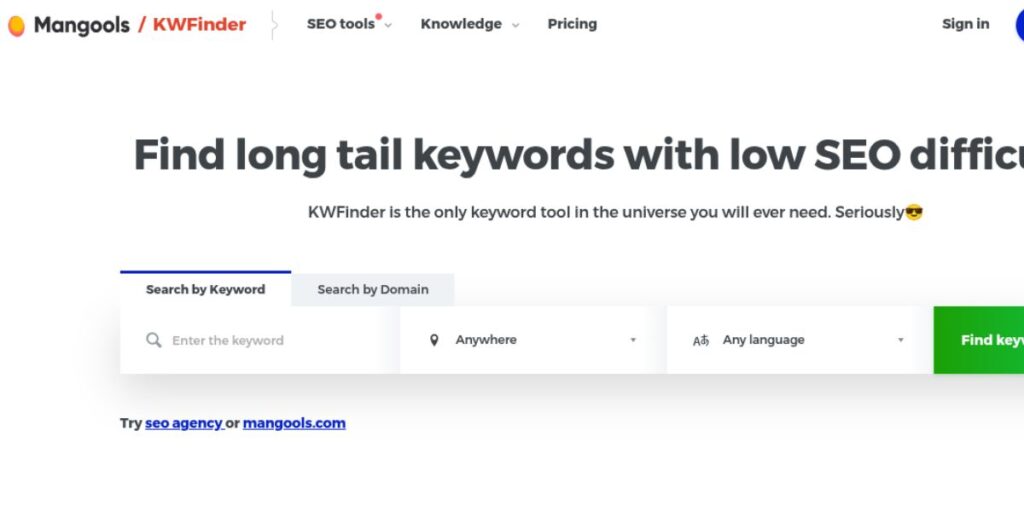
Beginner users find KWFinder by Mangools to be a keyword research tool that excels at discovering low-competition long-tail keywords. This tool gives users crucial SEO data including search trend numbers together with difficulty levels of chosen keywords in addition to helping analyze competitor strategies. The tool delivers a pleasing interface which makes it simple for novices to use it. The tool does not provide sophisticated PPC functionalities. This tool best matches bloggers along with small business owners and also includes SEO beginners in need of simple keywords that rank well.
Key Features:
- Keyword difficulty scoring
- SERP analysis with competitor insights
- Location-based keyword research
- Simple and intuitive interface
Pros:
- Great for finding long-tail keywords
- Affordable compared to competitors
Cons:
- Limited free searches per day
- No advanced competitor analysis tools
Pricing: Starts at $49/month
Who Should Use It?
Bloggers, content creators, and small business owners focusing on long-tail keyword SEO.
8. AnswerThePublic

AnswerThePublic provides an innovative keyword research system that creates visual search query displays from specified keywords. This tool obtains data from Google and Bing Autocomplete to identify related questions, comparisons, and prepositions which it displays in a simple-to-understand format. The tool functions exceptionally well for content generation by enabling marketers to develop articles and relative FAQs.
The tool provides limited SEO analysis capability because it does not include search volume metrics together with competition data. The tool serves marketing content producers blogging professionals and corporate users who need new material suggestions and knowledge about their readership
Key Features:
- Generates keyword ideas based on search queries
- Visual representation of search topics
- Provides prepositions and comparisons for content ideas
Pros:
- Great for content marketing and topic ideas
- Free version available
Cons:
- Limited keyword data for in-depth SEO analysis
- Requires a paid plan for more daily searches
Pricing: Free with limited searches, Pro plan starts at $5/month
Who Should Use It?
Content marketers, bloggers, and SEO professionals looking for topic ideas.
9. KeywordTool.io
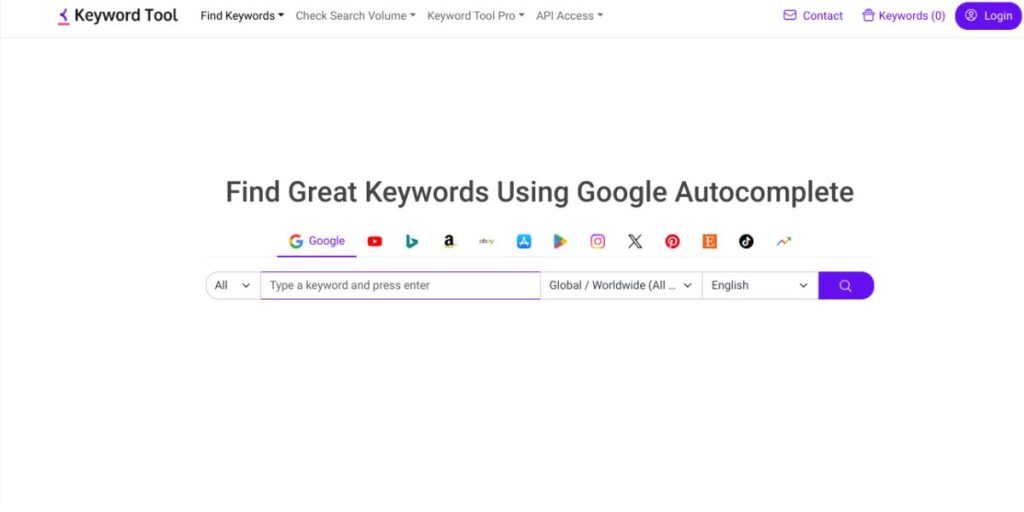
KeywordTool.io enables users to generate keyword suggestions through the Google Autocomplete function and supports research across YouTube, Amazon, Bing and eBay platforms. Paramount among its features is the large variety of keywords which proves useful for content marketing and SEO practices.
On the free plan, KeywordTool.io shows no search volume data alongside CPC data or competition data metrics that require paid plans. Its ability to discover specific keywords for niches remains useful for e-commerce sellers as well as bloggers and YouTube creators while offering businesses a chance to explore long-tail keyword possibilities.
Key Features:
- Provides keyword suggestions from multiple search engines
- Supports long-tail keyword research
- Helps with YouTube, Amazon, and eBay keyword research
Pros:
- Generates a large volume of keyword ideas
- No need for a Google Ads account
Cons:
- Limited free searches
- No search volume data in the free version
Pricing: Free with limited features, Pro plan starts at $89/month
Who Should Use It?
E-commerce sellers, YouTubers, and SEO professionals needing keyword suggestions across multiple platforms.
10. Serpstat
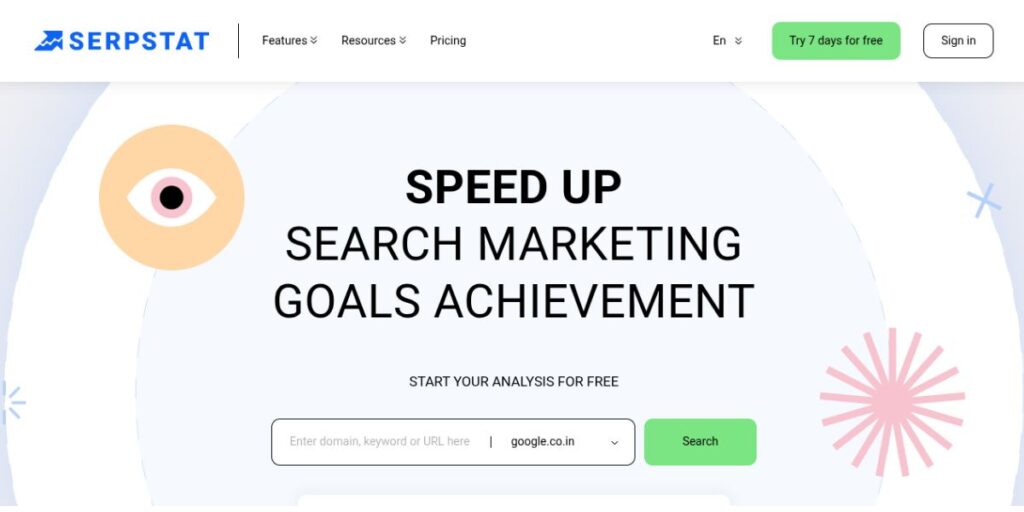
The SEO platform Serpstat delivers users a complete set of capabilities which include keyword research together with competitor analysis site audits and rank tracking features. Keyword research leads users to discover valuable searchable information regarding search volume keyword difficulty and cost-per-click features.
The keyword clustering along with the search intent analysis capability of Serpstat is accessible through its “Tree View” feature. The tool provides key keyword research capabilities but its compact database makes it less efficient when exploring niche markets. The tool meets the needs of small businesses SEO professionals and digital marketers because it provides effective SEO abilities at an affordable cost.
Key Features:
- Keyword research and clustering
- PPC analysis and competitor tracking
- Site audit and backlink analysis
Pros:
- Cost-effective compared to SEMrush and Ahrefs
- Multiple SEO tools in one platform
Cons:
- UI can be complex for beginners
- Limited keyword database compared to Ahrefs
Pricing: Starts at $59/month
Who Should Use It?
SEO professionals and businesses looking for an affordable alternative to SEMrush or Ahrefs.
11. Keyword Insights

Keyword Insights is an artificial intelligence keyword research tool that helps content creators, digital marketers, and SEO specialists discover, group, and analyze keywords efficiently. Unlike traditional keyword research tools, it not only offers keyword ideas but also exposes in-depth knowledge of search intent, user behavior, and rank opportunities.
Its AI-driven clustering feature categorizes keywords based on SERP similarities, facilitating easier planning of content with a more structured and streamlined process. Keyword Insights is ideal for mass keyword analysis, so it is a tool of value for agencies, bloggers, and companies looking to enhance their search visibility.
Key Features:
- AI-driven keyword clustering for better content planning
- Search intent analysis to categorize keywords (informational, transactional, etc.)
- SERP similarity scoring to determine ranking opportunities
- Competitor analysis and keyword gap identification
- Bulk keyword processing for large-scale SEO campaigns
Pros:
- Advanced AI-based keyword clustering
- Helps identify search intent effectively
Cons:
- Premium tool with no free plan
- May require learning for new users
Pricing: Starts at $58/month for basic features
Who Should Use It? Ideal for SEO professionals, content strategists, and agencies looking for advanced keyword clustering and intent-based insights.
12. SpyFu

The key functionality of SpyFu centers on SEO and PPC through its functions for keyword research along with competitor analysis. Through this tool, users gain access to their competitors’ keywords which generate the highest profits along with their search positions and advertising plans. SpyFu delivers useful historical keyword metrics combined with Google Ads campaign tracking features which makes it a highly beneficial tool for PPC advertisers.
One disadvantage for SEO specialists is SpyFu’s lack of keyword difficulty scoring since this feature would prove useful for their tasks. The tool satisfies the needs of digital marketers and business operators running Google Ads campaigns as well as SEO experts who want competitive insights.
Key Features:
- Competitor keyword research for SEO & PPC
- Google Ads history and performance tracking
- SERP analysis and backlink tracking
Pros:
- Excellent for competitor research
- Affordable compared to SEMrush
Cons:
- Limited keyword database compared to Ahrefs
- UI can be overwhelming for new users
Pricing: Starts at $9/month
Who Should Use It?
Marketers, PPC advertisers, and businesses focused on competitive intelligence.
13. Soovle
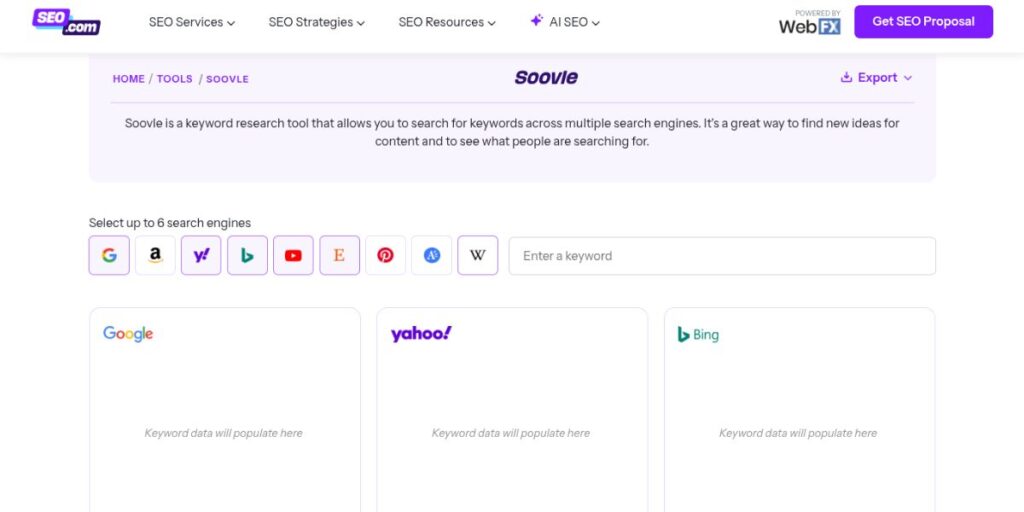
Soovle is a free, multi-platform keyword research tool that gathers autocomplete keyword suggestions from Google, Bing, YouTube, Amazon, and other search engines. The tool is simple and efficient for generating keyword ideas across multiple platforms quickly.
However, it does not provide search volume, keyword difficulty, or competition data, making it less useful for in-depth SEO analysis. Soovle is ideal for bloggers, content marketers, and businesses looking for fast keyword inspiration across different search engines.
Key Features:
- Autocomplete keyword suggestions from multiple platforms
- Simple and easy-to-use interface
- Free to use
Pros:
- Great for quick keyword ideas
- Covers multiple search engines
Cons:
- No search volume or competition data
- Lacks advanced SEO features
Pricing: Free
Who Should Use It?
Bloggers, content marketers, and beginners looking for quick keyword inspiration.
14. Keyword Surfer

The free Chrome keyword extension Surfer generates search volume data CPC information and keyword suggestions which users can view directly on Google SERPs. Users can evaluate keyword patterns inside Google search results without needing to exit to a different platform.
As a free resource Keyword Surfer delivers worthwhile information yet its paid tool competitors offer superior features for SEO analysis. Keyword Surfer serves freelancers and SEO beginners as well as marketers who need fast keyword insights through its free extension tool for Google search results.
Key Features:
- Displays keyword search volume in Google search results
- Provides SERP analysis and keyword suggestions
- Free to use
Pros:
- Convenient and integrates with Google search
- Free with no sign-up required
Cons:
- Limited keyword insights compared to paid tools
- Data may not be as accurate as premium tools
Pricing: Free
Who Should Use It?
SEO beginners, freelancers, and marketers needing quick keyword data while browsing Google.
15. Jaaxy
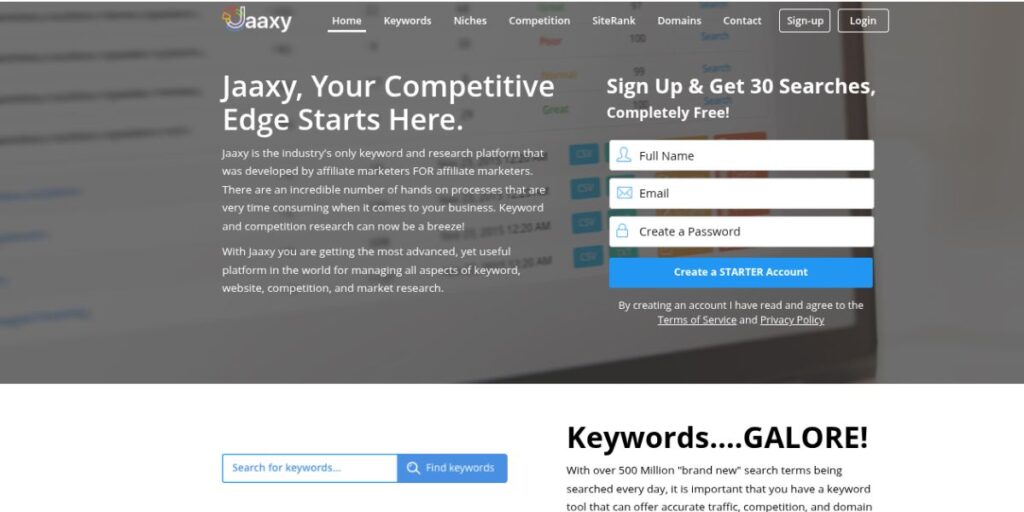
The search tool Jaaxy caters specifically to affiliate marketers because it enables users to find competitive boost keywords in low-competition niches. The tool analyzes keyword search volumes while measuring difficulty levels and affiliate program participation which makes it suitable especially for content writers who emphasize affiliate programs.
Although users find Jaaxy simple to operate the tool does not offer advanced SEO capabilities including SERP analysis and backlink tracking features. The main customers of Jaaxy are affiliate marketers who use the tool along with niche site operators and bloggers who want to locate low competition profitable keywords.
Key Features:
- Niche keyword research
- Domain availability checker
- SEO competition analysis
Pros:
- Great for finding low-competition keywords
- Simple and beginner-friendly
Cons:
- Lacks advanced SEO features
- No backlink analysis tools
Pricing: Starts at $49/month
Who Should Use It?
Affiliate marketers and niche website owners.
16. Wordtracker
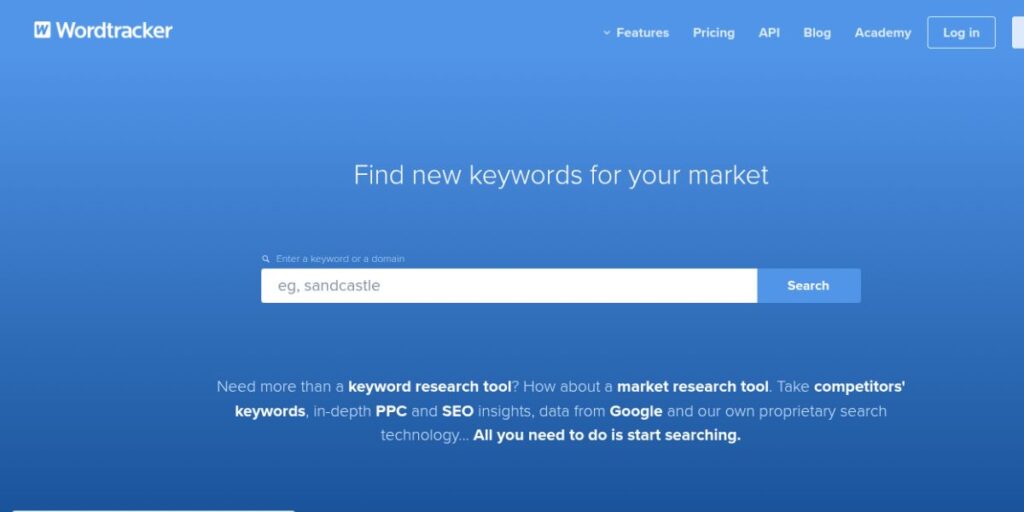
Wordtracker enables users to discover keywords through its search engine alongside competitive examination and Pay Per Click operational intelligence. Businesses together with marketers can discover effective keywords that promise high conversion rates through the help of this platform. Wordtracker serves as an ideal solution for businesses that operate with Google Ads PPC campaigns to discover their most useful keywords.
Users of Wordtracker can only perform limited searches during free trials because the platform does not offer all the sophisticated SEO capabilities available in competitor solutions. The tool works best for SEO professionals PPC advertisers and marketing professionals who need keyword opportunities for maximizing their organic search engine and paid advertising efforts
Key Features:
- Keyword search volume and competition score
- Google Ads keyword data integration
- Niche keyword discovery
Pros:
- Strong PPC keyword research capabilities
- Good alternative to Google Keyword Planner
Cons:
- Limited free searches
- Lacks competitor keyword tracking
Pricing: Starts at $24/month
Who Should Use It?
SEO professionals and PPC advertisers looking for alternative keyword research solutions.
Conclusion
Selecting the ideal keyword research tool is based on your individual needs and budget. Google Keyword Planner is ideal for beginners and advertisers who want free keyword information. SEMrush and Ahrefs are ideal for digital marketers and agencies because they provide complete SEO and competitive data. Ubersuggest and KWFinder are ideal for small businesses and bloggers because they have easy-to-use interfaces. Jaaxy is ideal for affiliate marketers who specialize in niche keywords.
For creators of content, AnswerThePublic and KeywordTool.io both offer insightful topic suggestions, while SpyFu is ideal for PPC advertisers looking to analyze competitor tactics. Ultimately, the greatest tool will be one that serves your purpose; whether it’s enhancing SEO, uncovering profitable PPC keywords, or grasping audience intent. Investing in a good keyword tool can increase traffic and rankings.
FAQs
1. What is a keyword research tool?
A keyword research tool assists users in identifying appropriate search terms that individuals use when entering keywords into search engines. It gives information such as search volume, keyword difficulty, and competition to optimize PPC and SEO campaigns.
2. Are free keyword research tools effective?
Yes, there are free tools such as Google Keyword Planner and Keyword Surfer that provide valuable insights, but they might not have features such as competitor analysis, keyword difficulty scores, and SERP tracking.
3. What is the best keyword research tool for SEO beginners?
Ubersuggest, KWFinder, and Google Keyword Planner are good tools for beginners with easy-to-use interfaces and valuable keyword information.
4. How do keyword research tools assist content marketing?
Keyword research tools such as AnswerThePublic and KeywordTool.io assist content marketers in finding trending topics and optimizing content for SEO.
5. What is the best competitor keyword analysis tool?
SEMrush, Ahrefs, and SpyFu offer extensive information on competitors’ keywords, backlinks, and PPC.

